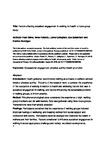Factors affecting sustained engagement in walking for health: A focus group study

Date
2016-08-26Author
Subject
Metadata
Show full item recordAbstract
<jats:sec><jats:title>Introduction</jats:title><jats:p> Health guidance recommends walking as a means to achieve advised levels of physical activity. The aims of the research were to consider the experience of the occupation of walking in relation to health and wellbeing, factors that lead to sustained engagement in walking and factors influencing the sustainable provision of walking groups, to inform practice. </jats:p></jats:sec><jats:sec><jats:title>Method</jats:title><jats:p> This phenomenological study considered the experience of eight walking group members and six walk leaders. Data were gathered using three focus groups. Transcriptions were thematically analysed. </jats:p></jats:sec><jats:sec><jats:title>Findings</jats:title><jats:p> Participants perceived that the experience of walking groups included improved feelings of wellbeing, and meaning derived from social support and connection with nature. Participants reported changes that improved the health of walkers and their families. Factors considered to influence sustained engagement in walking included appropriate challenge and variety, woodland developments, accommodation of routine, use of local green space and consideration of barriers. Factors considered to influence the sustainable provision of walking groups included facilitation style, health champions, marketing approaches and clarity and collaboration with primary care referrers. </jats:p></jats:sec><jats:sec><jats:title>Conclusion</jats:title><jats:p> Walking groups can be used to support individuals to engage in health-promoting occupations. An occupational perspective can usefully inform practice. </jats:p></jats:sec>
Collections
Publisher
Journal
Volume
Issue
Pagination
Recommended, similar items
The following license files are associated with this item:

